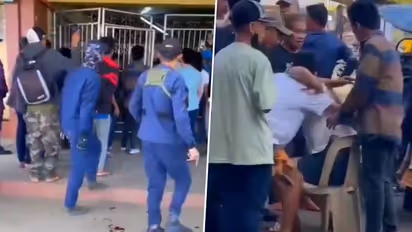Deadly bombing rocks Marawi: Philippines President blames 'foreign terrorists'; dramatic videos go viral

Synopsis
The blast in Philippines' Marawi occurred during a morning Catholic Mass in a university gymnasium, bringing back haunting memories of the city's siege by Islamist militants in 2017.
In a tragic incident that unfolded on Sunday, a deadly bombing shook the city of Marawi in the Philippines, resulting in at least four fatalities and over 50 injuries. Philippine President Ferdinand Marcos Jr swiftly condemned the attack, attributing it to "foreign terrorists." The blast occurred during a morning Catholic Mass in a university gymnasium, bringing back haunting memories of the city's siege by Islamist militants in 2017. As the nation grapples with the aftermath, this article delves into the details surrounding the bombing and the subsequent response from authorities.
President Ferdinand Marcos Jr, in a strong-worded statement, condemned the bombing as a "senseless and most heinous act" committed by foreign terrorists. He emphasized that those resorting to violence against innocent civilians would be considered enemies of society. The president's condemnation sets the tone for the government's response and determination to bring the perpetrators to justice.
"I condemn in the strongest possible terms the senseless and most heinous acts perpetrated by foreign terrorists upon the Mindanao State University (MSU) and Marawi communities early this Sunday morning. Extremists who wield violence against the innocent will always be regarded as enemies to our society," Marcos said in a post on X.
"I extend my most heartfelt condolences to the victims, their loved ones, and the communities that have been the target of this latest assault on peace. We are in close coordination with the regional government of the Bangsamoro Autonomous Region in Muslim Mindanao (BARMM) and the concerned Local Government Units. I thank them for their swift and immediate response to the incident and for their ready support to the victims," he added.
He further stated, "I have instructed the Philippine National Police (PNP) and the Armed Forces of the Philippines (AFP) to ensure the protection and safety of civilians and the security of affected and vulnerable communities. Additional security personnel are also being deployed. As reports come in throughout the day, I enjoin all of us to remain calm, circumspect, and conscientious in our collective efforts to ensure that the horrific events of this morning are not further compounded by inaccurate, unvetted, and unofficial information."
"Rest assured we will bring the perpetrators of this ruthless act to justice. Let us all keep the victims, their families, and our communities in our prayers," Marcos concluded.
In the wake of the bombing, law enforcement agencies, including police and the military, have intensified security measures across the country, particularly in the southern regions and around the capital, Manila. Defense Secretary Gilberto Teodoro, in a press conference, assured the public that operations to apprehend the terrorists responsible for this "terrorist activity" would continue without any letup. The defense secretary also hinted at the involvement of a foreign element, refraining from providing further details to protect the ongoing investigation.
Armed Forces Chief Romeo Brawner suggested a possible retaliatory motive for the bombing, considering recent military operations against local pro-Islamic State groups in the southern Philippines. Notably, a Sunday operation in Lanao del Sur resulted in the killing of a leader of the Dawlah Islamiya-Maute group. The connection between these military actions and the bombing is under scrutiny, shedding light on potential complexities in the region's security landscape.
Marawi, the capital of Lanao del Sur province, witnessed a prolonged siege in 2017 when the Islamic State-linked Maute group sought to establish it as a Southeast Asian governorate for the Islamic State. The ensuing five-month battle claimed over a thousand lives, including civilians. The recent bombing raises concerns about the lingering tensions and the persistent threat of extremist groups in the region.
The gymnasium at the Mindanao State University, where the bombing occurred, displayed burn marks in the center but otherwise appeared intact. Videos circulated on social media depicted rescuers carrying injured individuals out of the gym on plastic chairs. In response to the incident, police offices in Mindanao and the capital region were placed on high alert, with tightened checkpoints to prevent possible follow-up incidents. The coast guard also intensified pre-departure inspections at ports.
Mindanao State University, deeply saddened by the act of violence during a religious gathering, unequivocally condemned the senseless and horrific act. The university announced the suspension of classes until further notice, reflecting the gravity of the situation and the need for collective mourning and reflection.
As the Philippines grapples with the aftermath of the Marawi bombing, the nation stands united against terrorism. President Marcos Jr's condemnation and the swift response from security forces underscore the commitment to bringing those responsible to justice. The incident serves as a grim reminder of the persistent challenges posed by extremist groups in the region and the need for continued vigilance to safeguard the nation's security and unity.
Check the Breaking News Today and Latest News from across India and around the world. Stay updated with the latest World News and global developments from politics to economy and current affairs. Get in-depth coverage of China News, Europe News, Pakistan News, and South Asia News, along with top headlines from the UK and US. Follow expert analysis, international trends, and breaking updates from around the globe. Download the Asianet News Official App from the Android Play Store and iPhone App Store for accurate and timely news updates anytime, anywhere.